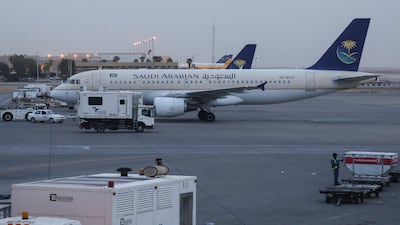Saudi Arabia on Monday opened its first Special Integrated Logistics Zone at King Khalid International Airport in Riyadh as part of plans to boost its cargo capacity, bolster supply chains and become a global logistics hub.
US tech major Apple is among the first tenants at the three-million-square-metre area that is designed to attract the world's top multinational companies from sectors including electronics, technology, pharmaceuticals, luxury products, jewellery and aerospace components, Mohammed Alkhuraisi, vice president of strategy at the General Authority for Civil Aviation (Gaca), told The National.
The iPhone maker will base a regional distribution centre in Riyadh to serve local demand, export and re-export to neighbouring markets.
Saudi Arabia is currently in various stages of negotiations with 20 high-profile global companies within these sectors to relocate to the kingdom with incentives such as tax exemptions, 100 per cent foreign ownership, streamlined licensing processes and “relaxed” Saudisation requirements, Mr Alkhuraisi said.
“Over the next 10 years, we expect 66 billion Saudi riyals [$17.60bn] in GDP [gross domestic product] contribution from this special economic zone in Riyadh and the creation of 29,000 jobs on a cumulative basis,” he said.
The new logistics zone is part of Saudi Arabia's wider plans to increase its cargo capacity to more than 4.5 million tonnes per year by 2030, up from 800,000 tonnes before the Covid-19 pandemic, increasing the contribution of the transport and logistics sector to national GDP to 10 per cent from 6 per cent currently, Gaca reported.
This will help to fuel business growth, attract inbound investment and increase the sector’s non-oil revenue to about 45 billion riyals a year by 2030, Gaca said in a statement.
Companies' activities in the new logistics zone in Riyadh will include manufacturing, distribution, repair and maintenance.
Saudi Arabia is also undertaking feasibility studies for additional Special Integrated Logistics Zones in Jeddah and Dammam, Mr Alkhuraisi said.
“The focus is on building a robust mode in Riyadh and then replicating it elsewhere,” he said.
“There will be positive spillovers for adjacent markets and the region.”
The new logistics zone in Riyadh aims to capitalise on Saudi Arabia's strategic location to help businesses serve customers in Africa, Asia and Europe.


